
January 8
1913 Hitler in Vienna: It is around this time that one of the more reliable witnesses to Hitler's last months in Vienna makes his appearance. Karl Honisch (not to be confused with Reinhold Hanisch), of Czech origin, encounters a Hitler at home among the 'intellectuals' in Mannerheim's workroom. He notes that Hitler had his own recognized space in the workroom. If someone tried to take this place, they would be warned by one of the others: "This place is occupied. This is Herr Hitler's place!" Honisch relates that Hitler was always willing to engage in conversation with his fellow residents: Thus I remember a thirty-year-old man by the name of Schoen. He was an unemployed estate manager, who apparently had a degree from a technical university. Hitler and he would frequently discuss agrarian issues, and Hitler took this so seriously that he would often take up pencil and paper to take notes. Then there was a certain Mr. Redlich, who had a graduate degree . . . . And there were several others, whose names I don't recall, among them workers and craftsmen, from whom Hitler was eager to learn about their professional fields. The Mr. Redlich mentioned by Honisch will later be identified as civil servant Rudolf Redlich, a Jew from Moravia, who resided at the Mannerheim from December 30, 1911 to June 28, 1914. This is yet another confirmation that Hitler, during his Vienna years, never showed any particular aversion to Jews. In fact, many of his Mannerheim peers were Jews, as were many of the local art dealers to whom he sold his paintings. From this and other accounts, it is clear that Hitler's later testimony—claiming that it was his time in Vienna that "opened his eyes" to the "insidious nature of the Jews"—is a total fabrication. It would not be until World War I that Hitler would display any anti-Semitism whatsoever. 
Honisch will later write that Hitler was one of the main members of the 'intellectuals,' and that "he used to sit in his place day by day with almost no exception and was only absent for a short time when he delivered his work; because of his peculiar personality. Hitler was, on the whole, a friendly and charming person, who took an interest in the fate of every companion . . . . Hitler was not an average person like us and, despite his 24 years, mentally he was superior to all of us . . . . Nobody allowed himself to take liberties with Hitler. But Hitler was not proud or arrogant; on the contrary, he was goodhearted and helpful." [For further details, Click here.]
1916 World War I: Allies retreat from Gallipoli:
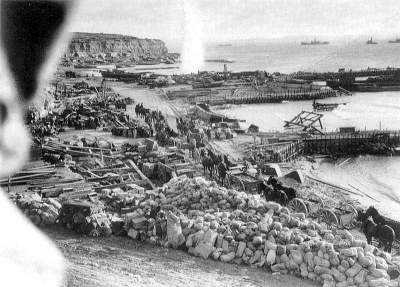
On January 8, 1916, Allied forces stage a full retreat from the shores of the Gallipoli Peninsula in Turkey, ending a disastrous invasion of the Ottoman Empire. The Gallipoli Campaign resulted in 250,000 Allied casualties and greatly discredited Allied military command. Roughly an equal number of Turks were killed or wounded. [For further details, Click here.]
1917 World War I: Battle of Magruntein (Jan 8-9): British forces clear the Sinai Peninsula of all organized Turkish forces. Sir Archibald Murray is then authorized to begin a limited offensive into Palestine, where the Turks have established defensive positions along the ridges between Gaza and Beersheba, the two natural gateways to the region.
1918 World War I: Fourteen Points: President Woodrow Wilson declares his 14 points 'the path to world peace' in a joint session of Congress. Although much of Wilson's Fourteen Points outrage the Allies ('the Lord God had only ten,' remarks the French leader), the Allies take comfort in the fact that the entire address rests on the defeat of Germany. As one American official points out, Wilson's address is 'an outline of war aims, not a peace address.'

In regard to these essential rectifications of wrong and assertions of right we feel ourselves to be intimate partners of all the governments and peoples associated together against the Imperialists. We cannot be separated in interest or divided in purpose. We stand together until the end. For such arrangements and covenants we are willing to fight and to continue to fight until they are achieved; but only because we wish the right to prevail and desire a just and stable peace such as can be secured only by removing the chief provocations to war, which this programme does remove. We have no jealousy of German greatness, and there is nothing in this programme that impairs it. We grudge her no achievement or distinction of learning or of pacific enterprise such as have made her record very bright and very enviable. We do not wish to injure her or to block in any way her legitimate influence or power. We do not wish to fight her either with arms or with hostile arrangements of trade if she is willing to associate herself with us and the other peace-loving nations of the world in covenants of justice and law and fair dealing. We wish her only to accept a place of equality among the peoples of the world—the new world in which we now live—instead of a place of mastery.
1931 Holocaust: The General Student Committee of the University of Erlangen, dominated by the National Socialists, makes a request to the Ministry of Culture for the creation of a chair of race-investigation, race-science, race-hygiene, and genetics. (THP)
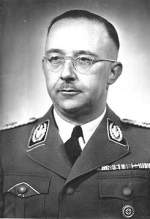
1933 Volkishness: Heinrich Himmler, while traveling in Westphalia, is inspired (probably by Weisthor/Wiligut) to begin thinking about acquiring a castle in the area, for use by the SS.
1935 Holocaust: Columbia Haus prison in Berlin becomes a concentration camp under the direct control of the Gestapo (THP)
1940 World War II: Various: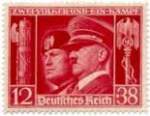
On this day, a message from Benito Mussolini is forwarded to Adolf Hitler. . . . . the Duce cautions the Fuehrer against waging war against Britain. Mussolini asked if it was truly necessary "to risk all-including the regime-and to sacrifice the flower of German generations."
Mussolini's message was more than a little disingenuous. At the time, Mussolini had his own reasons for not wanting Germany to spread the war across the European continent: Italy was not prepared to join the effort, and Germany would get all the glory and likely eclipse the dictator of Italy. Germany had already taken [Czechoslovakia] and Poland; if Hitler took France and then cowed Britain into neutrality—or worse, defeated it in battle—Germany would rule Europe. Mussolini had assumed the reins of power in Italy long before Hitler took over Germany, and in so doing Mussolini [had] boasted of refashioning a new Roman Empire out of an Italy that was still economically backward, and militarily weak. He did not want to be outshined by the upstart Hitler.
[See: How Did the Pact of Steel Effect Germany and Italy?]William Randolph Hearst stops Citizen Kane ads:

One of Hollywood's most famous clashes of the titans—an upstart "boy genius" filmmaker versus a furious 76-year-old newspaper tycoon—heats up on this day in 1941, when William Randolph Hearst forbids any of his newspapers to run advertisements for Orson Welles' Citizen Kane.
Though Welles was only 24 years old when he began working in Hollywood, he had already made a name for himself on the New York theater scene and particularly with his controversial radio adaptation of the H.G. Wells novel The War of the Worlds in 1938. After scoring a lucrative contract with the struggling RKO studio, he was searching for an appropriately incendiary topic for his first film when his friend, the writer Herman Mankiewicz, suggested basing it on the life of William Randolph Hearst. Hearst was a notoriously innovative, often tyrannical businessman who had built his own nationwide newspaper empire and owned eight homes, the most notable of which was San Simeon, his sprawling castle on a hill on the Central California coast.
After catching a preview screening of the unfinished Citizen Kane on January 3, 1941, the influential gossip columnist Hedda Hopper wasted no time in passing along the news to Hearst and his associates. Her rival and Hearst's chief movie columnist, Louella Parsons, was incensed about the film and its portrait of Charles Foster Kane, the Hearst-like character embodied in typically grandiose style by Welles himself. Even more loathsome to Hearst and his allies was the portrayal of Kane's second wife, a young alcoholic singer with strong parallels to Hearst's mistress, the showgirl-turned-actress Marion Davies. Hearst was said to have reacted to this aspect of the film more strongly than any other, and Welles himself later called the Davies-based character a "dirty trick" that he expected would provoke the mogul's anger.
Only a few days after the screening, Hearst sent the word out to all his publications not to run advertisements for the film. Far from stopping there, he also threatened to make war against the Hollywood studio system in general, publicly condemning the number of "immigrants" and "refugees" working in the film industry instead of Americans, a none-too-subtle reference to the many Jewish members of the Hollywood establishment. Hearst's newspapers also went after Welles, accusing him of Communist sympathies and questioning his patriotism.
Hollywood's heavyweights, who were already resentful of Welles for his youth and his open contempt for Hollywood, soon rallied around Hearst. Louis B. Mayer of Metro-Goldwyn-Mayer even offered to pay RKO $842,000 in cash if the studio's president, George Schaefer, would destroy the negative and all prints of Citizen Kane. Schaefer refused and in retaliation threatened to sue the Fox, Paramount and Loews theater chains for conspiracy after they refused to distribute the film. After Time and other publications protested, the theater chains relented slightly and permitted a few showings; in the end, the film barely broke even.
Nominated for nine Oscars, Citizen Kane won only one (a shared Best Screenplay award for Mankiewicz and Welles) and Welles and the film were actually booed at the 1942 Academy Awards ceremony. Schaefer was later pushed out at RKO, along with Welles, and the film was returned to the RKO archives. It would be 25 more years before Citizen Kane received its rightful share of attention, but it has since been heralded as one of the best movies of all time. (History.com)
1942 World War II: Japanese in USA: Admiral John W. Greenslade, Commandant of the Navy's Twelfth Naval District, urges that American-born and alien Japanese be excluded from areas of strategic importance.
1943 World War II: Various: FDR to Stalin:
After reading your reply to my radio concerning the Far East, I am afraid I did not make myself clear. As I previously explained reference South Caucasus, it is not practicable to send heavy bombers to Russia at this time, other than in existing organized units. Our proposal regarding one hundred planes referred to a situation which would occur if hostilities were actually to break out between Japan and Russia . . . . My deep appreciation for the continuing advances of your armies. The principle of attrition of the enemy forces on all fronts is beginning to work.

The Lisbon Report, confirming that the Germans are test-firing long range rockets in Peenemuende, falls into Allied hands. An excerpt:
Hitler and members of his Cabinet recently inspected both weapons (the V-1 and V-2) at Peenemuende. About 10th of June, Hitler told assembled military leaders that the Germans had only to hold out, since by the end of 1943 London would be leveled to the ground and Britain forced to capitulate. October 20th is at present fixed as Zero Day for rocket attacks to begin. Hitler ordered the construction of 30,000 A-4 (the original nomenclature for the V-2) projectiles by that day; this is, however, beyond the bounds of possibility. Production of both weapons is to have first priority and 1500 skilled workers have been transferred to this work from anti-aircraft and artillery production. (Brown) [See: Wunderwaffen: Hitler's Deception and the History of Rocketry.]
1944 Various:
Holocaust: Hans Fritzsche: From a radio speech: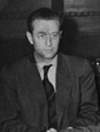
It is revealed clearly once more that not a new system of government, not a young nationalism, and not a new and well-applied socialism brought about this war. The guilty ones are exclusively the Jews and the plutocrats. If discussion of the postwar problems brings this to light so clearly, we welcome it as a contribution for later discussions and also as a contribution to the fight we are waging now, for we refuse to believe that world history will entrust its future development to those powers which have brought about this war. This clique of Jews and plutocrats have invested their money in armaments and they had to see to it that they would get their interests and sinking funds; hence they unleashed this war.
Holocaust: Gregor Schwartz-Bostunitsch and his private library of 40,000 anti-Jewish and conspiracy theory books, the heart of a proposed 'institute for conspiracy study' are evacuated in early 1944, from Berlin to Schloss Gneisenau at Erdmannsdorf (Riesengebirge) in Silesia for safekeeping. Later in the year, Bostunitsch is promoted to SS-Standartenfuehrer (colonel) upon the personal recommendation of Heinrich Himmler. (THP)
World War II: War at Sea: The RCN corvette Camrose and the British frigate Bayntun meet to sink U-boat U-757 in the North Atlantic.
1945 World War II: Various:
Churchill to FDR: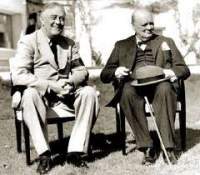
I am still thinking it of high importance that our military men should get together for a few days before we arrive at Yalta . . . . there are a tremendous lot of questions which should be looked into beforehand and our agenda ought really to be considered. What are your ideas of the length of our stay at Yalta? This may well be a fateful Conference, coming at a moment when the Great Allies are so divided and the shadow of the war lengthens out before us. At the present time I think the end of this war may prove to be more disappointing than was the last.
France: Battles continue north and south of Strasbourg and the US Seventh Army remains under strong pressure near Rimling and Gambsheim.
1946 Nuremberg Tribunal: The prosecution begins its case against individual defendants:
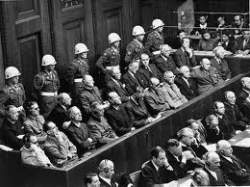
The Defendants Hess, Rosenberg, and Goering, were associated with Hitler since the very inception of the conspiracy. These men were among the original planners. They were the men who subsequently set the pace and cast the mould for the future. But there were also other conspirators (the balance of the defendants in the dock fit into this category), who voluntarily joined the conspiracy later. While these men may be characterized perhaps as cruel, callous, or inhuman, they certainly may not be called dull or stupid. They knew, and had had the opportunity to observe, the manifestations of Nazi violence and Nazi methods as the pattern of the swastika developed. [For the full text all of today's proceedings, Click here.]
1959 France: Charles De Gaulle is inaugurated as president of the Fifth Republic. (AP)
1976 Death: Chinese leader Zhou Enlai dies:

Zhou Enlai, premier of the People's Republic of China (PRC) since 1949, dies of cancer at age 77. Zhou was second to Mao Zedong, the leader of the revolution that brought a communist regime to China, in terms of importance in the PRC. Beyond his significance as a leader of communist China, Zhou was instrumental in the negotiations that resulted in the U.S. recognition of the PRC in 1979.
Zhou was born in 1898, and he was heavily involved in the Chinese Communist Party (CCP) by the 1920s. He rose quickly through the party ranks and became one of Mao Zedong's most trusted advisors, particularly valued for his skill at negotiations and diplomacy. These skills were crucial during the 1930s, when the CCP found it necessary to collaborate with its enemy, the Chinese Nationalists, to oppose Japanese aggression. In 1949, the CCP was victorious in its civil war against the Nationalists and Zhou was appointed premier and foreign minister of the new government.
During the 1950s, he represented China at various diplomatic gatherings, including the 1954 Geneva Conference and the 1955 Asian-African Conference in Bandung. He was also a stabilizing force inside China during the tumultuous years of the Cultural Revolution and its resultant political tensions.
In the early 1970s, Zhou embarked on a program to rebuild relations with the United States, which had refused to recognize the Chinese communist government. In 1972, he and President Richard Nixon shocked the world by meeting and agreeing to work for closer political and economic relations between the two nations. These talks eventually did bear fruit in 1979, when the United States formally recognized the PRC. (History.com)
Edited by Levi Bookin (Copy editor)
levi.bookin@gmail.com



Click to join 3rdReichStudies

FAIR USE NOTICE: This site may contain copyrighted material the use of which has not always been specifically authorized by the copyright owner. We are making such material available in our efforts to advance understanding of historical, political, human rights, economic, democracy, scientific, environmental, and social justice issues, etc. We believe this constitutes a 'fair use' of any such copyrighted material as provided for in section 107 of the US Copyright Law. In accordance with Title 17 U.S.C. Section 107, the material on this site is distributed without profit to those who have expressed a prior interest in receiving the included information for research and educational purposes. If you wish to use copyrighted material from this site for purposes of your own that go beyond 'fair use', you must obtain permission from the copyright owner.
Please note that the list-owner and the moderators are not responsible for, and do not necessarily approve of, the random ads placed on our pages by our web server. They are, unfortunately, the price one pays for a 'free' website.